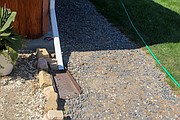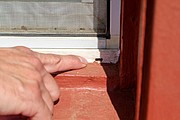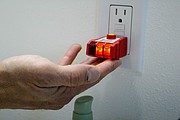For homeowners, home security is an important consideration to ensure that all systems and structures in their home are functioning properly. A problem with a faucet or electrical wiring in the house can quickly worsen.
Darrel Jensen obtained his home inspection license last winter before opening his new business, E&M Home Inspection LLC, in June. Jensen said he spent a lot of time learning to fix things in his homes growing up.
One of the most important factors that drove him to start his new business was that his young children were running around the house and he wanted to make sure that all facets of his home were safe and functional.
Jensen said he looked at more than 400 different structures and sub-categories within the house during an inspection. First and foremost, he said he was checking the structural integrity of a home before moving on to more nuanced functions and general security.
Basic house inspections he claims to look for the first time he walks into a house include proper ventilation, making sure gases and water drains are properly drained from the house, and outdated or faulty wiring or plumbing.
Jensen said that his family’s home in Moses Lake was built in the 1960s and that he had to fix many undersized wires. This outdated wiring can quickly lead to problems in the house.
He said he has come across homes where the vent from bathroom fans or exhaust fans outside the home doesn’t stop properly, but instead ventilates air into the attic or crawl space.
“That is problematic, bringing moisture into your attic or crawl space, is only conducive to mold and insect activity, and it’s just an unhealthy situation,” said Jensen.
For HVAC systems in this Washington area, dealing with the summer heat and harvest season dust can be detrimental factors to an air conditioning or heating system. Jensen said he always recommends annual air conditioning maintenance, cleaning the outer coils and cooling fins to make sure everything is clean and working properly.
He recommends changing the filter every 30 days to avoid dust or smoke build-up. When it’s time to turn the stove on, expect a burning smell for the first few minutes, but shouldn’t linger for more than 15 to 30 minutes, Jensen said.
He recommends the same annual maintenance for chimneys, with just one annual visual inspection to make sure everything is free of debris. This area of the state is prone to building beehives or bird nests in these areas, which can clog some of the ventilation and potentially damage the device’s components. A rain cap on a chimney can help reduce moisture build-up and prevent sparks.
Houses in rural areas or near the outskirts, such as the Dune Lakes neighborhood, see a greater amount of dust during harvest season because they are surrounded by farmland.
“It comes back to maintenance because that dust gets into all of the window rails and all of the seals and just sticks everything together,” said Jensen.
Plumbing is another big part of the home inspection, and people should check for signs of leaks or previous water damage. Jensen said he checks the pipes, under the sink and anywhere he can get without taking anything apart or opening anything.
Make sure drains in any of the crawl spaces, attic, or subfloors are not causing water damage to find the problem before it starts damaging the house from the inside.
“If we don’t keep track of maintenance and take care of one problem, it can quickly lead to the next and catastrophe,” said Jensen.
As soon as he sees a problem during an inspection, he recommends referring the homeowner to a properly licensed electrician, plumber, architect, or engineer to help resolve the problem.
As a home inspector, he said he often had to think “like a raindrop”.
“As it would hit the house, where it would puddle, rain is ultimately the number one destroyer of houses,” Jensen said. “Getting rid of water properly and removing it from the foundation is key.”
Rain gutters are something homeowners don’t often think about other than holding drainage from sidewalks. He said it was important to make sure that water doesn’t build up around the foundation of the house as it can soften the soil around the base of the house and cause further problems on the street.
Typically, he said he was on the roof of houses to check the distance between the siding and the roof and how the water is diverted from the house.
With so many new homes in the Columbia Basin, Jensen said he’s mostly looking for minor imperfections in the construction process. He is happy to help new homeowners become familiar with how the various systems in their home work and the general maintenance they should expect every five, 10, or 15 years.
General home safety measures, like having the right amount of fire and carbon monoxide detectors, are vital. For homeowners with a pool, proper gates and fences help keep their children and children in the neighborhood safe from accidents.
Properly cleaning the dryer openings of lint is another important factor that can help keep appliances from having problems or creating safety concerns.
Jensen says he’s happy to help homeowners who have questions about any questions about the structure or security of their home and can be reached at 509-771-0366.






Comments are closed.